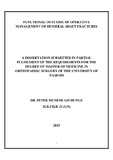| dc.description.abstract | Fractures of the humeral shaft are common, accounting for approximately 3% of all orthopaedic
injuries according to a study by World Health Organization1, and result in a significant burden to
society from lost productivity and income. These humeral shaft fractures have traditionally been
regarded as benign, with high percentage of primary healing with conservative methods.
However loss of reduction in the plaster cast invariably leads to malunion. Surgery is however
indicated in some of these patients for optimum outcome. With improved implant design and
surgical technique, operative management of humeral shaft fractures has increasingly become
accepted2, 3.
Most of the studies have used fracture union as the major determinant of the outcome and very
few studies have examined the functions at the shoulder and elbow.
PURPOSE
To study functional outcome of operative management of humeral shaft fractures
VARIABLES TO BE EVALUATED
Age of the patient, etiology/cause of trauma, time and place of injury, occupation of the patient,
associated injuries (e.g. neuro-vascular status, tendon injury), pain, instability, activities of daily
living, motion and function.
STUDY DESIGN
Prospective Analytical Study
SETTING
Kenyatta National Hospital and PCEA Kikuyu Hospital Orthopedic surgery wards, clinics and
casualty
STUDY DURATION
1st April 2013 to 1st April 2014
METHODS AND MATERIALS
Purposive sampling method was used to select 45 patients who sustained humeral shaft fractures
requiring surgery. A thorough history and clinical examination was done. Age of the patient,
etiology/cause of trauma, time and place of injury, occupation of the patient, associated injuries
were recorded in a trauma sheet. | en_US |
| dc.description.department | a
Department of Psychiatry, University of Nairobi, ; bDepartment of Mental Health, School of Medicine,
Moi University, Eldoret, Kenya | |

